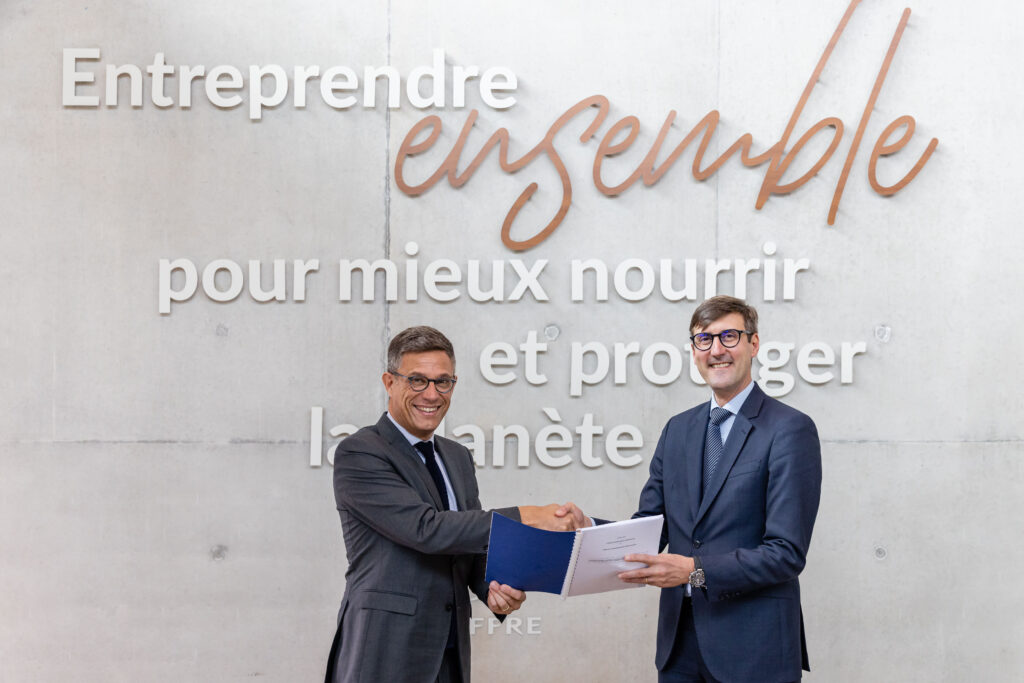Brice-Audren Riché, CEO of Lesaffre, and Damien Térouanne, Executive Vice President of ENGIE Solutions, today formalized a 15-year partnership for the design, financing, construction, operation and maintenance of a waste heat recovery unit on the Lesaffre site in Marcq-en-Barœul. Thanks to the installation of two high-powered heat pumps that will be commissioned in 2025, the heat created by Lesaffre’s fermentation activity will be reused. In this way, Lesaffre will be able to cover 70% of its heat needs, avoid the emission of around 30,000 tons of CO₂ per year and reduce its water consumption by 150,000 m3 per year.
Lesaffre, a key global player in fermentation for 170 years, will install this new waste heat recovery unit at the heart of the Group’s largest yeast plant in the world at its historic site in Marcq-en-Barœul.
Within the framework of this project, Lesaffre has asked ENGIE Solutions to help it recover the energy effluents linked to its production process and thus reduce its dependence on fossil fuels.
This project is part of the approach undertaken by Lesaffre for several years to control its carbon footprint and its energy consumption. Indeed, Lesaffre has defined a clear trajectory for the decarbonization of its production sites, based on seven pillars: improving energy efficiency, deploying electrification, using biomass and by-products, optimizing the use of biogas, developing renewable energies, entering into long-term contracts with green energy suppliers, and finally measuring and valorizing avoided emissions.
As part of this approach, Lesaffre has already undertaken several comparable projects aimed at reducing CO2 emissions, for example through the installation of a biomass plant at the LIS by Lesaffre site in Cérences (Normandy, France) or the installation of a wind turbine at the Algist Bruggeman site (Belgium) to help cover part of the site’s electricity needs.
Complementarity of the production stages: recovering the waste heat from one stage to feed the other.
The whole project is based on the complementarity of one production stage to the other. The idea is to capture the heat generated on the site and currently dissipated into the air by cooling towers and redirect it to another production stage requiring the use of heat, currently generated by a gas boiler room.
In concrete terms, the installation of two heat pumps with a total capacity of 19 MWth will make it possible to transform the heat produced in the fermentation workshop during the yeast cell multiplication stage into heat for another workshop in the plant, dedicated to drying the yeast. This system will also make it possible to reduce the site’s water consumption, with 150,000 m3 of water saved per year.
This innovative and visionary project is a winner of the ADEME’s call for projects to decarbonize industry and has received a €5.6 million subsidy.
“With this heat recovery unit, Lesaffre will be able to decarbonize two thirds of its activity at the Marcq-en-Barœul site. This project, like other initiatives at several of our other sites, is fully in line with a global and ambitious roadmap for decarbonizing the Group’s production sites. By working to significantly reduce our environmental impact, we are demonstrating that Lesaffre’s growth can only be sustainable and responsible,” says Brice-Audren Riché, CEO of Lesaffre.
“Through this partnership, we are supporting an industrial company that is resolutely committed to the search for energy and environmental performance.
The joint work between the ENGIE Solutions and Lesaffre teams has enabled this virtuous project to emerge: a competitive energy supply while greatly reducing dependence on fossil fuels”, says Damien Térouanne, Executive Vice President of ENGIE Solutions.
Key Figures:
- 30,000 tons of CO₂ avoided per year
- 150,000 m3 of water saved per year
- 15 years
- 19 MWth heat pump
- Commissioning in 2025
- 5.6 M€ of subsidy


